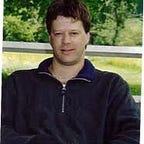Greg Mankiw and the economic ideology of free trade
International trade isn’t always beneficial, as economists well know. So how can the Chairman of the Harvard economics department imply otherwise? And not be professionally humiliated?
Irritated by this recent and I think highly dishonest Op-Ed in the New York Times by Harvard economist Greg Mankiw, I had written a column in response for Bloomberg View. In the column, I pointed out some of the sleight of hand Mankiw had used in arguing that Congress should go ahead and give President Obama “fast track” status to negotiate a trade deal — the Trans-Pacific Partnership — with nations in the Pacific. In short, Mankiw in his piece didn’t mention a host of inconvenient things that economists know about the real world consequences of trade, and did so, apparently, so that he could push a narrow ideological argument in favor of his position. Shameful behavior, I think. Not at all a model of what an academic should be doing.
If I was irritated, so was Noah Smith, who also wrote a column in response —and faster than me! — and ended up getting into Bloomberg first. So my effort was wasted. Fair enough. To be even more fair, I have to admit that Noah’s article was better than mine: he knows way more economics than I do, and brought it to bear very effectively.
But I would like to draw on what I did write to emphasize some things that Noah didn’t. When economists let ideology get in the way of scientific reasoning, they can do a lot of damage — particularly when choosing policies that affect the lives of millions. Dogmatic faith in the self-correcting features of markets, for example, helped clear the way for the 2008 financial crisis and amplified its consequences. After the financial crisis there was some talk of the need for a code of ethics for economists, but nothing ever happened. Mankiw’s behavior is a pretty good illustration of why something like that is needed. As a respected economist at a prestigious institution, his words carry weight and influence lots of people.
Many people think that economists’ views are often motivated by ideology, and I know that economists generally don’t like that idea. But Mankiw’s Op-Ed could be exhibit A of the evidence.
He argued that, because nearly all economists agree that international trade is always good, Congress should hurry up and go forward with the Trans-Pacific Partnership (or TPP). As he put it, despite economists’ penchant for “vociferous debate,” the issue is a “no-brainer” for them. He invoked Adam Smith, who pointed out that the people of a nation can benefit by producing and exporting what they can make most efficiently, while importing other goods from elsewhere. He could have (but didn’t) invoked David Ricardo’s idea of comparative advantage to make the argument a little more sophisticated. Mark Thoma discusses that clearly here.
But it doesn’t take a PhD in economics to see that Mankiw, who headed the Council of Economic Advisers under President George W. Bush, is offering a simplified and highly partial explanation of how economists think the world works. If this is economics, then it’s economics run through a filter of conservative ideology. Mankiw himself recognized as much: In an open letter to Congress last month, he and 12 economists noted that the benefits of free trade are “unevenly distributed and some people are negatively affected.”
Many economists — including Columbia’s Joseph Stiglitz — have argued that whether or not free trade will benefit a nation depends on many conditions, including government control of labor conditions, environmental regulation and the pace of socioeconomic change. As Richard Green points out, research suggests that trade between two nations tends to help already advantaged sectors, which in the U.S. would mean a better outcome for capital over labor, and for skilled labor over unskilled. Although economists largely agree that trade increases the total size of economies, that doesn’t mean that the losers will be better off. The losers, in fact, might well vastly outnumber the winners.
In other words, any trade agreement almost certainly benefits some parties and hurts others. The identity of those parties should be the central issue facing congressional leaders, who must answer to their constituents. That’s far from a no-brainer.
None of this means that the trans-Pacific agreement is necessarily bad. The proposed deal is actually less about trade and more about intellectual property rights and their enforcement. There are legitimate concerns that it can be used to get around environmental protections, and even to undermine democratic governments if they get in the way of corporate profits. Then again, there are good points. Green, for example, argues that such agreements decrease the likelihood of wars, and that’s nothing to take lightly.
Trade deals should be struck on the merits, not as a result of ideological persuasion and claims that economists agree on something they do not. It’s good that Richard Green and Noah Smith and Mark Thoma have all pushed back against Mankiw, bringing more of the full picture of what economists know about free trade into the open. But it would be even better if the culture of economics was such that a Harvard professor writing very publicly about an important economic issue would be ashamed to offer such a skewed picture of what the best economics says about it. Today, it still seems that naked ideology, even by respected professors, gets a pretty free ride.
Many economists hope others will consider their field to be scientific, at least in some sense, as a body of knowledge built up through dispassionate attention to logic and facts. If so, then academics making appeals to ideology need to be punished. Maybe not formally — that might open many cans of worms — but at least by a broad loss of respect. It may be old-fashioned, but Mankiw really should be ashamed.
